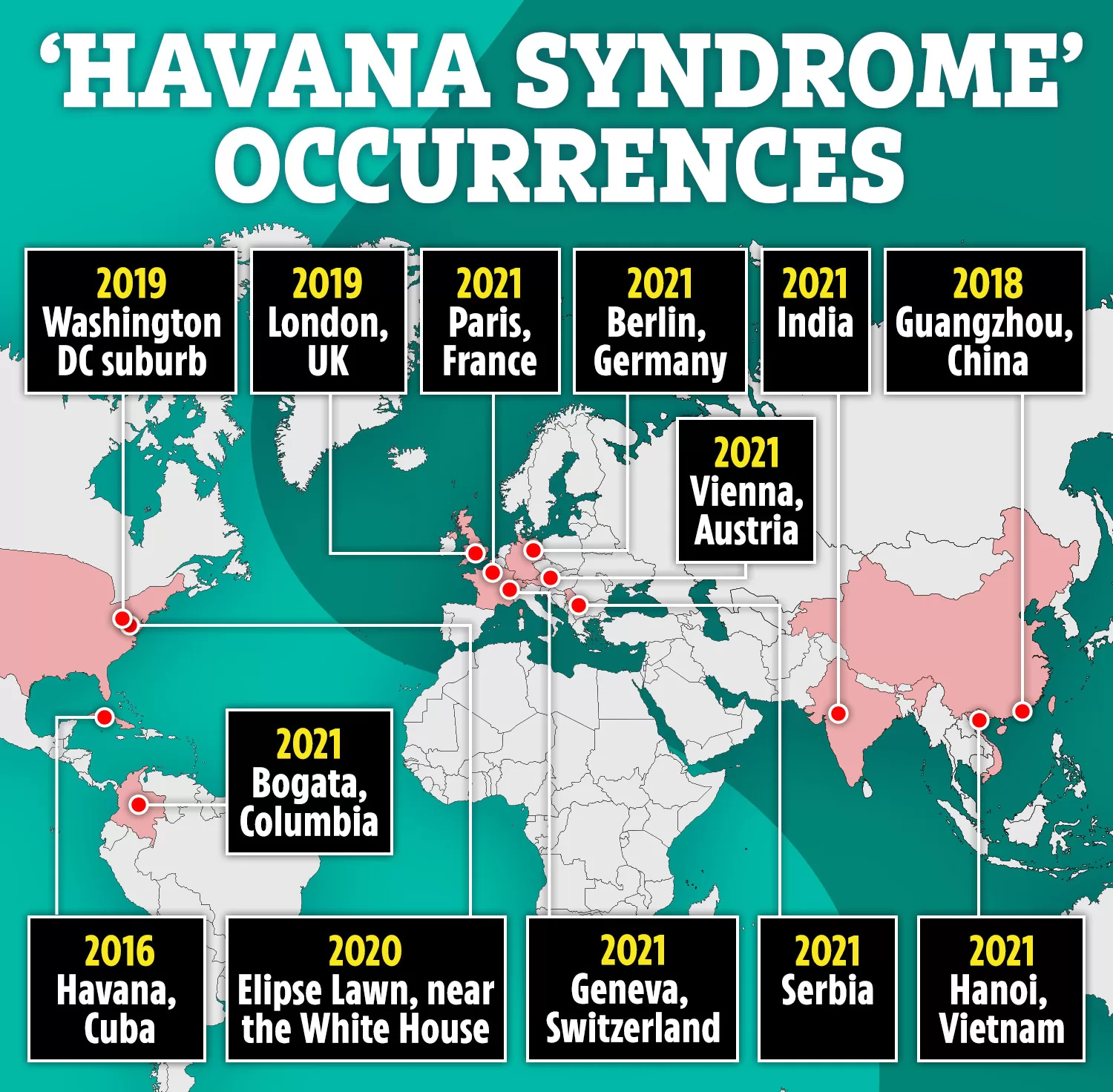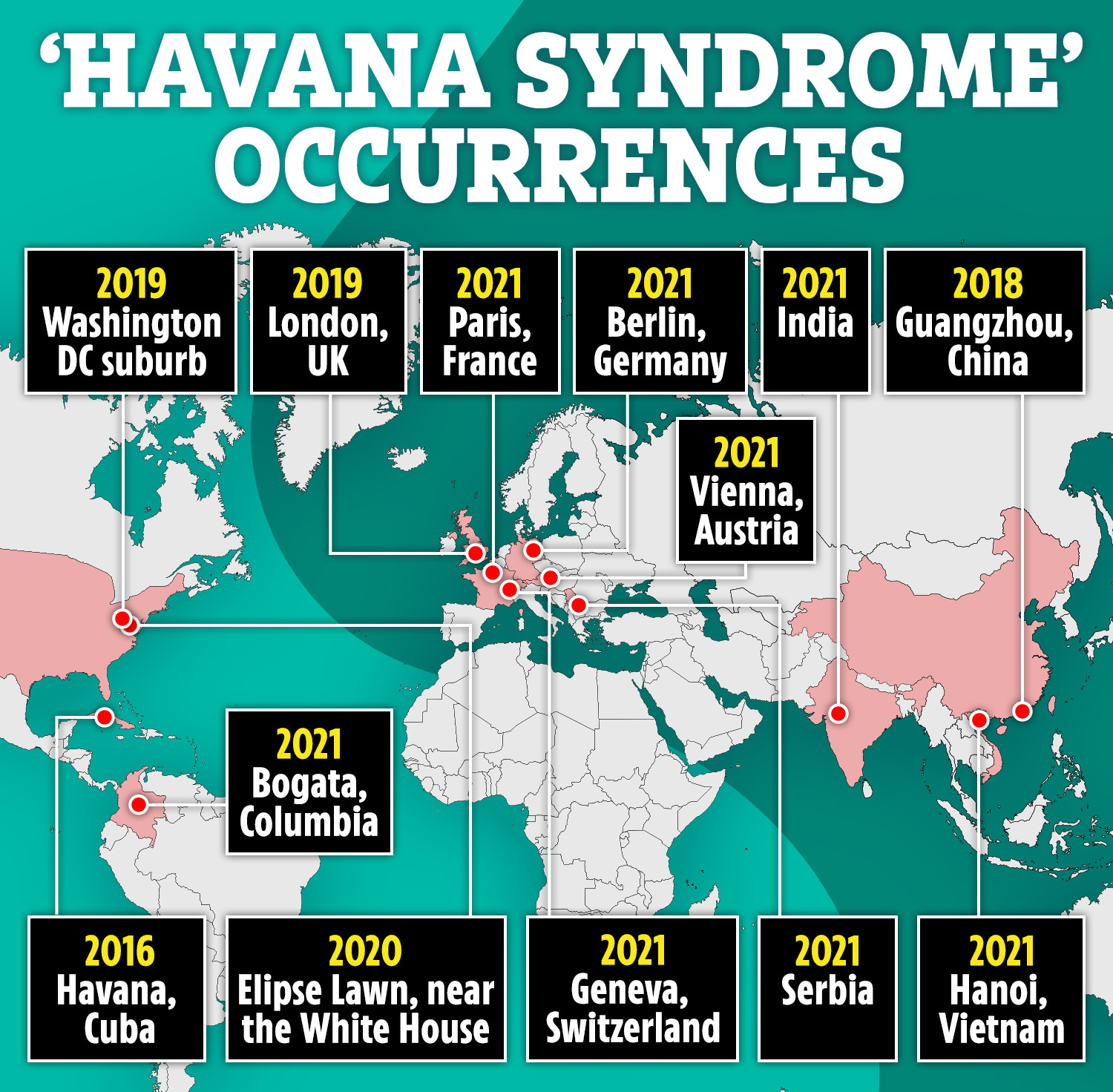Between 2016 and 2018, US embassy staff working in Cuba started complaining of strange sensations of sound and pressure in their heads.
For some, the symptoms were temporary.
But others, suffered long-term debilitating issues, from headaches and memory loss to vision problems, which led to some having to quit their jobs.
Eight years later, at least 200 occurrences of “Havanna syndrome” have been reported in a list of countries, including China, Colombia, France, and the US.
Theories about the cause of the symptoms fueled arguments that the illnesses were caused by secret weapons like microwaves by a foreign country.
Read more on Havana syndrome
In 2018, US intelligence officials believed Russia to be a leading suspect in deliberate attacks on diplomats and CIA officers overseas.
However, not enough evidence has ever been recovered to point towards an absolute culprit of the health incidents.
Russia has denied any involvement.
‘Quite profound, disabling and difficult to treat’
The new study, conducted researchers at the US National Institutes of Health (NIH), found no signs of brain injury despite also identifying “real symptoms” of the mystery ailment they called “quite profound” and “disabling”.
One of the studies published on Monday examined brain imaging while the other looked at blood biomarkers and clinical assessments of hearing, vision, hand-eye coordination, cognitive ability and balance.
Neither study, published in the Journal of the American Medical Association, found any significant differences between a control group, and about 80 sufferers of the condition.
Despite the lack of visible scarring seen in their MRI tests, the NIH doctors behind the new study voiced sympathy for the afflicted diplomats and the their health complaints.
“These individuals have real symptoms and are going through a very tough time,” Dr Leighton Chan, NIH’s chief of rehabilitation medicine and the study’s lead author, wrote.
“They can be quite profound, disabling and difficult to treat.”
While that couldn’t rule out some temporary injury when symptoms began, researchers said it’s good news that they couldn’t spot long-term markers on brain scans that are typical after trauma or stroke.
That “should be some reassurance for patients,” said study co-author Louis French, a neuropsychologist at Walter Reed National Military Medical Center who treats Havana syndrome.
What is havana syndrome?
A set of mysterious medical symptoms first seen in US offcails in Cuba’s capital.
Since 2016, people from the US working for the government from several different countries have experienced similar symptoms:
Most people with Havana syndrome hear a loud noise and feel intense pressure or vibration in their head, as well as pain in their ears or head.
Other symptoms included problems with:
- Cognition (e.g., related to memory and concentration)
- Dizziness and balance
- Headaches
- Irritability
- Light and sound sensitivities
- Nausea
- Ringing in the ears, which is called tinnitus
- Sleep impairment
Source: health.com
“It allows us to focus on the here and now, to getting people back to where they should be.”
The NIH study, which began in 2018 and included more than 80 Havana syndrome patients, wasn’t designed to examine the likelihood of some weapon or other trigger for Havana syndrome symptoms.
If some “external phenomenon” was behind the symptoms, “it did not result in persistent or detectable pathophysiologic change,” he said.
Akin to shell shock
Despite the lack of medical evidence, participants continued to report fatigue, post-traumatic stress (PTSD), depression, dizziness, vertigo and unsteadiness that cannot be explained by another illness
Dr Louis French, a neuropsychologist at Walter Reed National Military Medical Center and a co-investigator on the study, said: “The post-traumatic stress and mood symptoms reported are not surprising given the ongoing concerns of many of the participants.
“Often these individuals have had significant disruption to their lives and continue to have concerns about their health and their future. This level of stress can have significant negative impacts on the recovery process.”
In 2019, a separate study by the University of California said that Havana syndrome was likely psychological illness, triggered by the fear of working in a hostile “cauldron of stress” in Cuba and China.
The team said the phenomenon is more akin to shell shock, with the symptoms paralleling those associated with war trauma.
The authors said the diplomats were still living in a Cold War-eque environment, where they were living under under constant surveillance.


